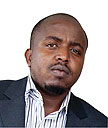Rid sports administration of “goalkeepers”
Some years back a regional sports personality used the term Potato growers to describe sports administrators in a neighboring country.

Daniel R. Kasule
